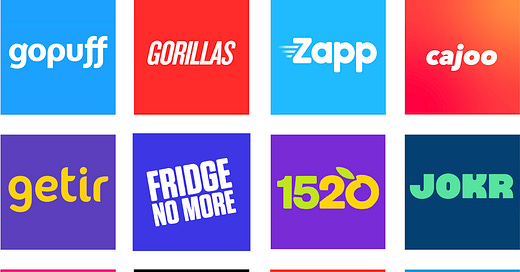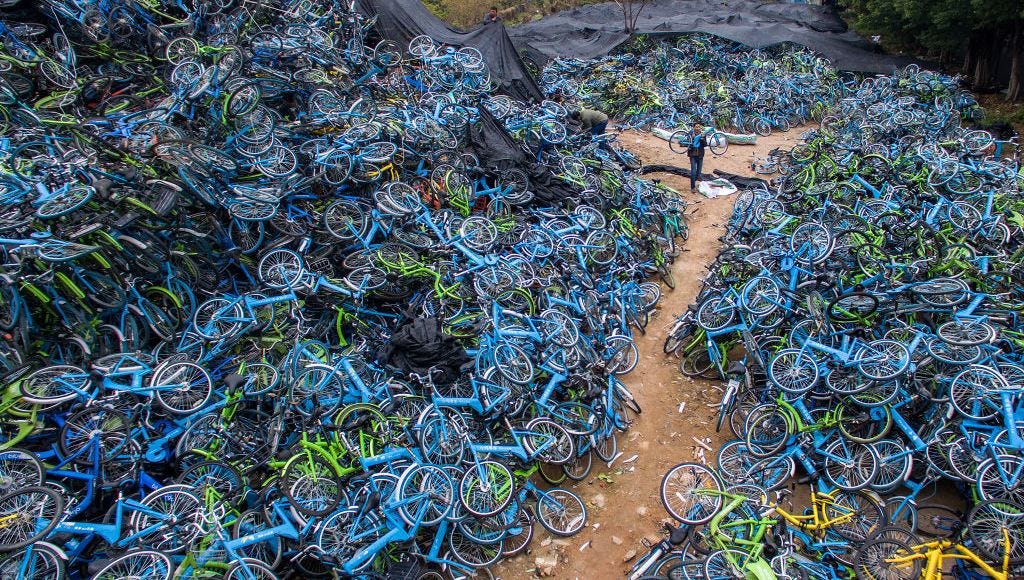Quick Commerce: Everything Is Express, Even Layoffs
The closure is the second within a week for a super-fast delivery service in New York City. Unable to refinance, Fridge No More is leaving hundreds of people unemployed.
This startup had launched in October 2020, followed by its competitors Jokr, Buyk and the German Gorillas, which raised nearly a billion dollars six months ago! Want more? Philadelphia-based GoPuff bought British startup Dija, in order to launch in Europe. Getir is based in Istanbul and is already worth nearly 12 billion... Their recipe? Always the same: deliver faster and faster to the largest number of consumers, these companies seduce investors, rent small spaces to store a limited number of references and then offer big discounts on the first orders and spend lavishly on marketing to make themselves known.
It feels like a return to the future. For generations, grocers delivered to their neighbors, shopkeepers called on a regular schedule, milk carts made their morning rounds, and the mail arrived at least twice a day. In Victorian London, the letter carrier knocked seven times, so you could send an invitation - and receive a reply - to lunch on the same day.
It's the fashion of the Q-Commerce, certainly. But for what long-term model? In New York City, Councilmember Christopher Marte believes this promise of food delivery in just a few minutes "creates a lot of risk, a lot of pressure and a lot of stress for these workers." We won't decide the debate here, but the first results are there: local shops weakened, employees more and more precarious, a generation of consumers who don't know how to wait more than 15 minutes.... In the end, of all these actors, only one or two will remain. The same story as with e-scooters, bike-sharing, etc. Who will survive? The strongest, the fastest or the hippest? What a waste, isn't it?
Analysis 💡 Successive Crises Force Managers To Manage Vulnerabilities
A new era has opened up for middle and senior managers, that of managing fragility, whether it is their own, which they do not allow themselves to reveal, or that of their teams, explains the expert in decisional intelligence, Marine Balansard, Executive Director of Ariseal.
In an effort to keep their teams operational and meet their goals, they have been hard at work for the past two years. Many managers have failed to take care of themselves. This fatigue makes people weak and doubtful. Most of them know that their practices must evolve rapidly to adapt to the new expectations of their employees and to the new "hybrid" work organizations. This requires training and time for experimentation. Managers today, without always being fully prepared (neither by their studies nor by habit), take on the roles of counselor, psychologist and mediator, managing as many individual situations as there are employees.
Managing fragility is a necessity for managers. Employees expect them to support them, understand them and decide accordingly. If fragility allows to generate links and mutual support, to encourage empathy and a better mutual understanding, it should not be imposed as a central parameter of management. The giant shoulders of managers, who want to be "strong" in these times of crisis, cannot carry everything. Read her article (in French) in Les Echos.
Speak up 📣 Does Power Corrupt (or are corrupt people drawn to power)?
Brian Klaas is an associate professor at University College London and Washington Post columnist who also advises governments and companies. Across the board, he found similar reasons why psychopaths, narcissists, and other corruptible people rise to the top.
So, what I tried to figure out in my new book, and what spurred the research, was whether there is a commonality here. Do we have a universal human trait of corruptible people seeking power, or does power universally turn people corrupt? The remedy to those two diagnoses is quite different. There’s a third dimension which is that if corruptible people seek power more than the rest of us and if power corrupts—both of which, by the way, are true—how do we reengineer society and redesign systems to make sure that incorruptible people seek and obtain power and that power actually doesn’t corrupt people but purifies them?
DATA 📊 Is Cash Still King 🤑?
In a context where top talent is extremely hard to attract, retain and grow, most companies seek to differentiate by increasing wages and cash bonuses versus competitors.
But research has shown that it isn’t always the best way to go. In fact:
Talking about intangible benefits in job ads can get you significantly more applicants compared to higher paying offers (study on 92,000 job ads)
Intangible benefits lead to much higher job satisfaction than cash incentives (study on 150,000 employees)
And cash rewards can actually severely backfire if collaborators expect them before executing a task!
➡️ Want to know more?
See this recap LinkedIn post by our Data Lead Sarah Jallot 🦸♀️, and credits to findings by Behavioural Scientist Ashley Whillans from Harvard Business School!
News 🗞️ Don’t Forget The Human Behind The Screen
Twitter’s dialog warning is the latest in a longtime battle to help us be more civil to one another online. Perhaps more disturbing is the fact that we train large-scale AI language models with data from often toxic online conversations. No wonder we see the bias reflected back to us in machine-generated language. What if, as we’re building the metaverse – seemingly the next version of the web – we use AI to filter toxic dialogue for good?
How we handle language in the metaverse could set the tone for its future.
A borderless society could level the playing field for people (and their avatars) who speak less common languages and foster greater cross-cultural understanding. How do we continue to encourage diversity of opinion, while limiting abusive or offensive speech and behavior? One industry-backed group believes that the metaverse can avoid the ills of social media. The reverse could also be true with immersiveness increasing the impact of any toxicity, and the interoperability part could make content moderation very difficult. To be followed closely as everything is built now...
The Nugget 🍪 Poor Sleep Linked To Higher Heart Risk
Growing evidence suggests that poor sleep is linked to a host of health problems, including a higher risk of high blood pressure, diabetes, obesity, and heart disease. Now, a recent study on people in midlife finds that having a combination of sleep problems — such as trouble falling asleep, waking up in the wee hours, or sleeping less than six hours a night — may nearly triple a person’s risk of heart disease.
If you have trouble falling or staying asleep, there are many ways to treat these common problems, from simple tweaks to your daily routine to specialized cognitive behavioral therapy that targets sleep issues. These are well worth trying, because getting a good night’s sleep helps in many ways.
More 👉 here
To remind you
"ppl first" is committed and benevolent for employees, managers, and founders !
What is ppl first ? It's a company that puts the employee at the heart of the strategy, considering that a fulfilled worker will make a healthy and sustainable business.
Why ppl first ? Everything is accelerating and for years customer is too often the top priority, the employee is sometimes an adjustment variable. Less considered, he/she's also less committed.
How ppl first ? There are many ways to achieve this (or to stay this way) but there is a common base. When a staff member would not recommend to his friends to work with him/her, when the management does not have clear values to defend etc. Staff is at risk and the company with it. To have or maintain a people first culture you need to care about your employees as individuals.





